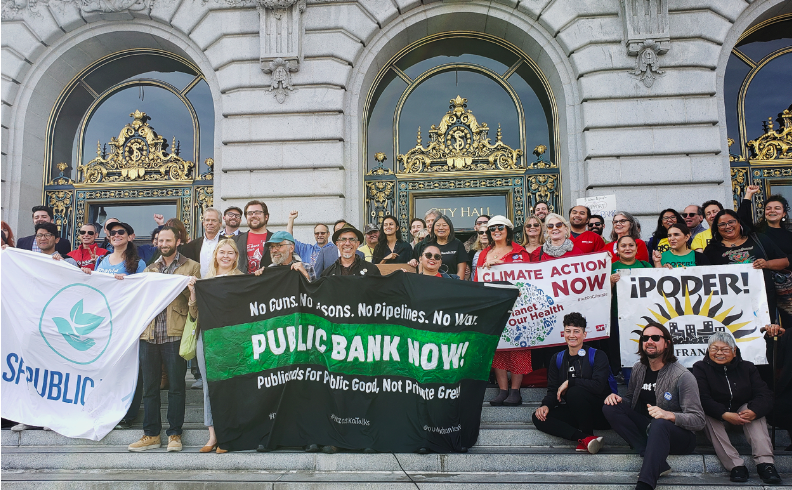On Thursday/19 at 3pm, newly-hired public banking consultant HR&A Advisors will join the Reinvest in San Francisco Working Group in formulating a plan to establish San Francisco’s first public bank since the city was founded more than 200 years ago.
Last June, the Board of Supervisors took an important step towards setting up a public bank for the city by unanimously passing the Reinvest in San Francisco ordinance introduced by Supervisor Dean Preston. Another dramatic step came on April 15, 2022, with the first official meeting of the Working Group, composed of financial professionals and community representatives charged with preparing a business plan for the bank. After being approved by the Board of Supervisors, the plan will be submitted to the California Department of Financial Protection and Innovation in Sacramento.

While there are 910 public banks worldwide commanding assets of $49 trillion, the US has only one, in North Dakota. Consequently, there is no blueprint for setting up public banks in the US.
Nevertheless, San Francisco is determined to be among the first California communities leading the way for the US to join nations as diverse as Germany, Switzerland, Costa Rica, Brazil and Japan, which have had public banks successfully operating for generations.
Thomas Marois, an expert on public banking from Oxford University, will join members of the Working Group at a Local Agency Formation Commission meeting the following day, Friday/20 at 10am.
The nine-member Working Group is composed of three financial experts and four authorities in community concerns affected by the public bank, such as affordable housing, environmental justice, and small business support, in addition to representatives from the city treasurer and controller. San Francisco is fortunate to have Sylvia Chi, one of the authors of the historic California legislation authorizing public banking (AB 857), in the group.
A public bank for San Francisco would result in significant benefits for the city. Foremost, it would be able to amplify city financial resources for projects that directly improve the lives of San Franciscans. Virtually all of the receipts paid to SF (taxes, fees, fines and state and federal allocations) are currently entrusted to massive corporate banks with little interest in making substantial investments benefiting locals.
Among the advantages:
Help us save local journalism!
Every tax-deductible donation helps us grow to cover the issues that mean the most to our community. Become a 48 Hills Hero and support the only daily progressive news source in the Bay Area.
- A public bank could assure financing for permanently affordable energy-efficient housing. The most effective means of doing this is converting existing buildings into affordable housing. Public banks can provide bridge loans and loan guarantees for purchasing existing properties, removing them from the speculative housing market by converting them into permanently affordable social housing. A public bank could speed up construction of new affordable housing by securing sources of capital more efficiently.
- A public bank could prioritize local investments in badly needed green infrastructure such as cost-saving and environmentally beneficial solar panels, LED lights, transportation electrification, and retrofits for improved insulation and energy saving appliances such as on-demand water heaters in public buildings, which will save taxpayers money while they address the climate crisis.
- A public bank could provide financing for local enterprises such as worker coops like Arizmendi Bakeries and Rainbow Grocery, as well as businesses owned by people of color and women who have been historically denied loans from banks solely focused on profit maximization.
Financial proficiency comes with the inclusion of three leaders in community banking. Jennifer Finger, executive vice president of strategy and development at Beneficial State Bancorp, has worked there since 2015, helping assets grow from $500 million to $1.4 billion. Rafael O. Morales spent nine years at the National Federation of Community Development Credit Unions, representing more than 250 community development credit unions and now serves as senior manager for development policy and Impact at Self-Help Federal Credit Union. Elizabeth Dwyer who brings a decade’s experience with nonprofit Community Development Financial Institutions developing operations to deliver microcredit programs that help small businesses, and currently is director of Fondo Adelante (Mission Community Loan Fund LLC) at the Mission Economic Development Agency.[1]
Having people in the Working Group with direct experience in these arenas will provide the necessary background to assure the bank is realistic about what it can accomplish. Architect and planner Fernando Marti has more than ten years of experience in affordable housing as co-director of Council of Community Housing Organizations. Bookstore and bar owner Christin Evans is well-versed in the challenges of running a small business. Michelle Pierce has 23 years of experience working in sustainability and social justice while working closely with businesses and residents of Bayview Hunters Point.
Rick Girling is co-director of the San Francisco Public Bank Coalition





